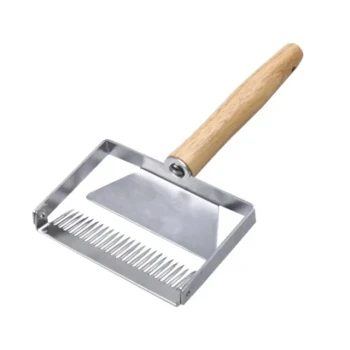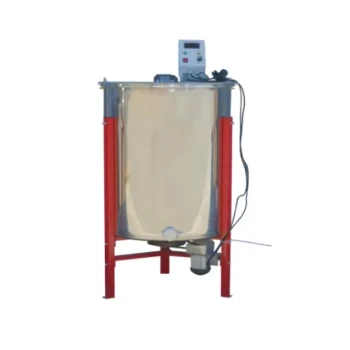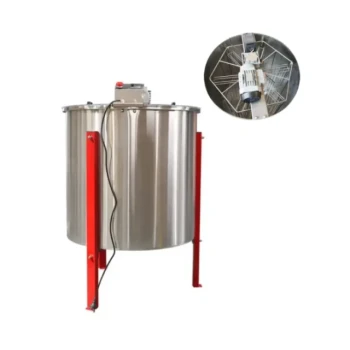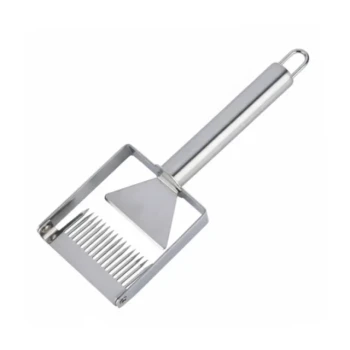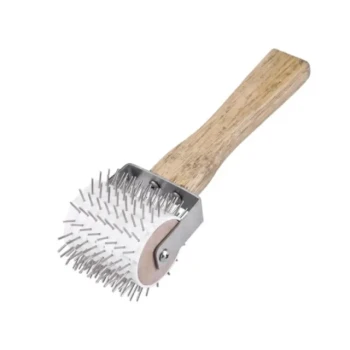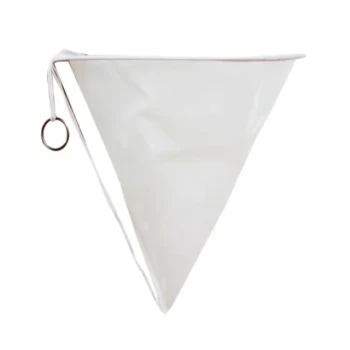Proper storage is crucial for preserving the integrity of a propolis tincture. To ensure its longevity and potency, it must be kept in a clean, dark, and airtight bottle. The high-proof alcohol used in the tincture acts as a powerful preservative, but its effectiveness depends entirely on protecting it from environmental degradation.
The goal of proper propolis tincture storage is to shield its beneficial compounds from the three primary agents of degradation: light, oxygen, and contamination. Your storage method is a direct defense of the tincture's potency.

The Pillars of Propolis Tincture Preservation
Understanding why certain conditions are required is key to effective long-term storage. The principles are based on simple chemistry and microbiology.
Why 'Dark' Matters: Preventing Light Degradation
Light, particularly UV light from the sun, is a form of energy that can break down the complex and beneficial compounds in propolis, such as flavonoids.
This process, known as photodegradation, permanently reduces the tincture's potency. Using dark glass bottles, such as amber or cobalt blue, effectively blocks these harmful wavelengths.
Why 'Airtight' is Essential: The Role of Oxidation
The air around us contains oxygen, which is highly reactive. When the compounds in propolis are exposed to oxygen, they can oxidize, changing their chemical structure and diminishing their effectiveness.
A securely sealed, airtight lid minimizes the tincture's contact with fresh oxygen. It also prevents the alcohol base from slowly evaporating over time.
Why 'Clean' is Non-Negotiable: Avoiding Contamination
A tincture is a preserved product, but it is not invincible. Using a bottle that is not perfectly clean and dry can introduce moisture or microbes that the alcohol may not fully neutralize.
This can potentially alter the tincture or introduce unwanted impurities. Always use a thoroughly cleaned or sterilized container before bottling.
The Role of Alcohol as a Preservative
The high-proof, food-grade alcohol used to create the tincture is the primary preservative. It creates an environment where bacteria and other microbes cannot grow.
This is why denatured or rubbing alcohols must never be used; they are not safe for consumption and the preservative action relies on a sufficiently high concentration of pure ethanol.
Common Storage Mistakes to Avoid
Even with the right container, simple mistakes can compromise your tincture's quality over time.
Ignoring Heat and Temperature Swings
Heat acts as a catalyst, accelerating the chemical reactions that cause degradation, including oxidation.
Store your tincture in a cool, stable location like a cupboard or pantry. Avoid places with fluctuating temperatures, such as near a stove, on top of a refrigerator, or on a sunny windowsill.
Using Plastic Containers
While convenient, many plastic containers are not ideal for long-term storage. Some plastics can be permeable to oxygen, defeating the purpose of an airtight seal.
Furthermore, the high alcohol content can potentially leach unwanted chemicals from certain types of plastic over time. Glass is always the superior choice.
Forgetting to Label Properly
An unlabeled dark bottle can be easily mistaken for something else. This is a significant safety risk.
Always label your tincture clearly with the contents ("Propolis Tincture") and the date it was bottled. This helps you track its age and ensures it is never misused.
Making the Right Choice for Your Goal
Your storage strategy should align with how you plan to use the tincture.
- If your primary focus is maximum longevity: Store the tincture in a dark amber glass bottle, filled as close to the top as possible to minimize air, and place it in a cool, dark cupboard.
- If your primary focus is convenient daily use: Decant a smaller amount into a separate dropper bottle for easy access, while keeping the larger "stock" bottle sealed and properly stored to protect its quality.
- If your primary focus is ensuring safety and potency: Always use sterilized glass containers and clearly label them with the contents and date before storing them away from light and heat.
Following these core principles will ensure your propolis tincture remains a potent and stable preparation for years to come.
Summary Table:
| Storage Factor | Key Action | Why It Matters |
|---|---|---|
| Light | Use dark amber/blue glass bottles | Prevents UV degradation of beneficial compounds like flavonoids |
| Air/Oxygen | Ensure an airtight seal; fill bottle near full | Minimizes oxidation and alcohol evaporation |
| Contamination | Use clean, dry, sterilized containers | Prevents introduction of moisture and microbes |
| Temperature | Store in a cool, stable place (e.g., cupboard) | Heat accelerates chemical degradation |
Ensure your propolis tinctures maintain their quality from production to end-user. Proper storage is just one part of the equation; using high-quality, durable beekeeping supplies is essential. At HONESTBEE, we supply commercial apiaries and beekeeping equipment distributors with wholesale-focused, reliable packaging and storage solutions designed to protect your valuable products.
Contact our experts today to discuss how our equipment can help safeguard your propolis tinctures and other bee products, ensuring they reach your customers with maximum potency and shelf life.
Visual Guide
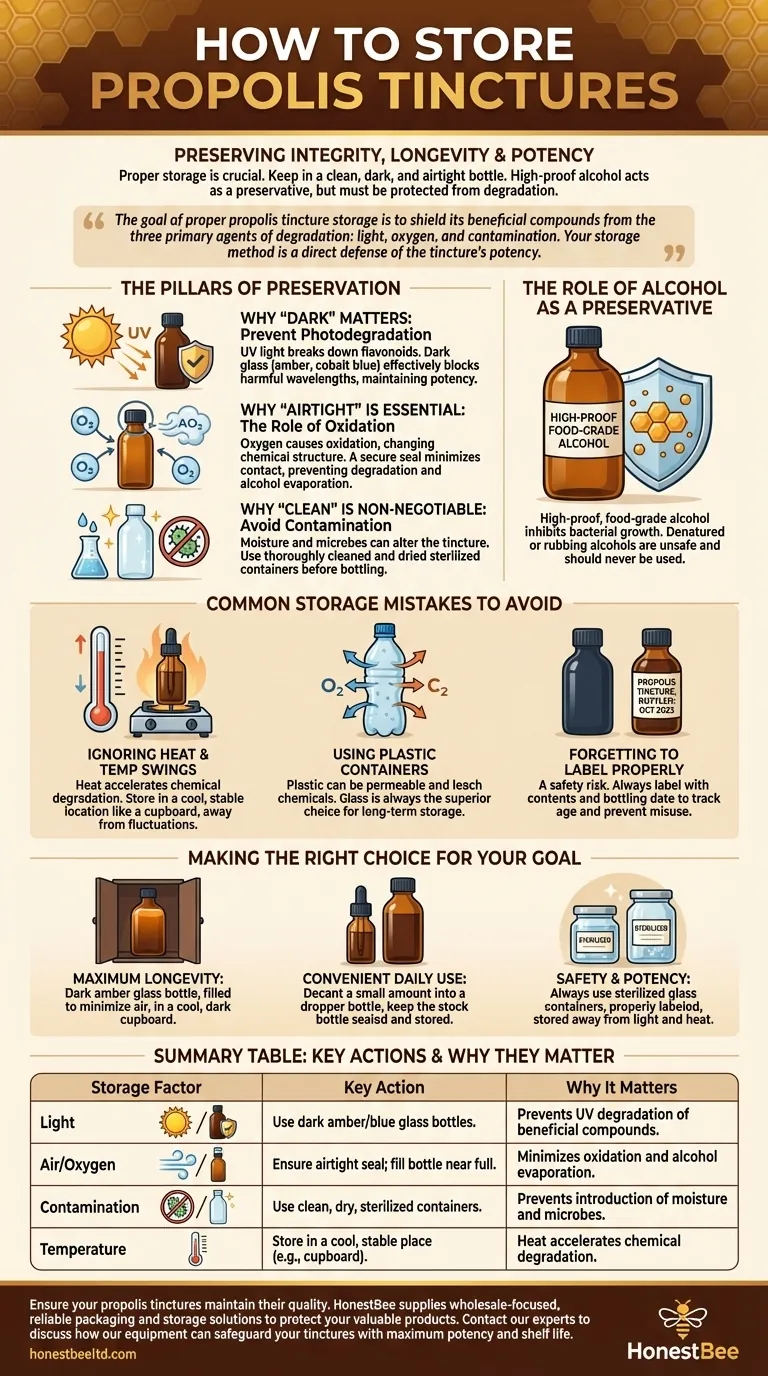
Related Products
- HONESTBEE 3-Frame Manual Acrylic Honey Extractor
- Manual Hand Crank 4 Frame Honey Extractor Centrifuge for Beekeeping
- Extra Wide Stainless Steel Honey Uncapping Fork with Scraper Beekeeping Tool
- Professional 4 Frame Self Reversing Electric Honey Extractor for Beekeeping
- HONESTBEE 6 Frame Self Reversing Electric Honey Extractor for Beekeeping
People Also Ask
- What is the design logic and function of propolis traps? Optimize Hive Health & Commercial Propolis Harvest
- What is the primary function of professional refrigeration in propolis pre-treatment? Optimize Extraction Efficiency
- Why must propolis be processed into powder? Essential Pretreatment for Accurate Chemical Analysis
- What is propolis and how is it used in beekeeping? A Guide to the Hive's Natural Defense
- Under what specific circumstances can a rubbing alcohol-based propolis tincture be used in beekeeping? Safety Guide
- How can chunks of propolis be processed into powder? Master the Freezing Method for Pure Propolis Powder
- What is the key function of an orbital shaker in propolis extraction? Maximize Your Phenolic Compound Yield
- How do specialized consumables for collecting royal jelly and propolis help diversify apiary income? Boost Your Profits


